- Home
- Sebastian Faulks
War Stories Page 24
War Stories Read online
Page 24
‘Bead, I know you’ve been pretty upset by what happened to you today. That’s unavoidable. Anybody would be. I thought perhaps you might like to talk about it, and maybe relieve yourself a little. I dont know that what I would have to say to you about it would be of any help, but I’m willing to try.’
Bead stared at him in astonishment, and Stein, giving his knee a couple of pats, turned and looked sadly off across the basin toward Hill 207, the command post of yesterday.
‘Our society makes certain demands and requires certain sacrifices of us, if we want to live in it and partake of its benefits. I’m not saying whether this is right or wrong. But we really have no choice. We have to do as society demands. One of these demands is the killing of other humans in armed combat in time of war, when our society is being attacked and must defend itself. That was what happened to you today. Only most men who have to do this are luckier than you. They do their first killing at a distance, however small. They have a chance, however small, to get used to it before having to kill hand to hand and face to face. I think I know what you must have felt.’
Stein paused. Bead did not know what to say to all this, so he did not say anything. When Stein turned and looked at him for some answer, he said, ‘Yes, sir.’
‘Well, I just want you to know that you were morally justified in what you did. You had no choice, and you mustn’t worry or feel guilty about it. You only did what any other good soldier would have done, for our country or any other.’
Bead listened incredulously. When Stein paused again, he did not know what to say so he didn’t say anything. Stein looked off across the basin.
‘I know it’s tough. You and I may have had our little differences, Bead. But I want you to know’ – his voice choked slightly – ‘I want you to know that after this war is over, if there is anything I can ever do for you, just get in touch with me. I’ll do everything I possibly can to help you.’
Without looking at Bead he got up, patted him on the shoulder and left.
Bead stared after him, as he had done after Doll. He still did not know what he really felt. Nobody told him anything that made any sense. But he realized now, quite suddenly, that he could survive the killing of many men. Because already the immediacy of the act itself, only minutes ago so very sharp, was fading. He could look at it now without pain, perhaps even with pride, in a way, because now it was only an idea like a scene in a play, and did not really hurt anyone.
Shusaku Endo
WE ARE ABOUT TO KILL A MAN
In his novel The Sea and the Poison (1957), Shusaku Endo describes the personal disintegration of Suguro, a young Japanese doctor who was forced to assist in a cruel experiment – the vivisection of American prisoners of war.
WHEN THE RECEPTION was over, my sister-in-law and her husband left for the station. The relatives and I saw them off there. Rain had begun to fall throughout the city. As soon as the honeymooners had departed, everyone began to feel ill at ease. The family invited me to a restaurant with them; but I told them I was tired, and I returned to my inn. There were scarcely any guests there. After the chambermaid had laid out my bedding, I sat for a long time cross-legged, thinking – thinking and smoking one cigarette after another. After I had slipped under the thick quilted spread, I couldn’t sleep. I kept on thinking about what the bridegroom’s cousin at the reception had told me about Dr Suguro in such a stealthy voice. I could hear the sound of falling rain on the roof. From somewhere far away inside the hotel a group of maids with nothing to do were laughing and talking.
If I dozed off, I soon awoke. In the darkness the image of Dr Suguro would loom up and disappear again and again, his grey, puffy face, his thick caterpillar fingers. Once more I felt the chilling touch of those fingers on the skin of my right side.
There was more rain the next day. In the afternoon I went out in the midst of it to visit a newspaper office in the city.
‘Excuse me, but I was wondering if it would be all right to take a look at some back numbers of your paper.’
The girl at the receptionist’s desk gave me a suspicious look, but she put through a call to the archives for me.
‘An article from about what time?’
‘Right after the war. There was a trial wasn’t there, about the vivisections at Fukuoka Medical School?’ I asked.
‘Do you have any kind of authorization?’
‘No, no, nothing like that.’
Finally I got the necessary permission. In a corner of the third floor archives, I read through the back numbers covering that period for about an hour. It was the affair involving the staff of the Medical School during the war. Eight captured American airmen had been used for medical experiments. In general the purpose of the experiments had been to obtain such information as how much blood a man could lose and remain alive, how much salt water in place of blood could safely be injected into a man’s veins, and up to what point a man could survive the excision of lung tissue. There were twelve medical personnel involved in the vivisections, two of them nurses. The trial opened in Fukuoka but was later transferred to Yokohama. Towards the end of the list of defendants, I found Dr Suguro’s name. There was nothing in the articles about his part in the experiments. The professor of medicine who had been in charge of the experiments committed suicide at the first opportunity. The principal defendants received long prison terms. Three, however, got off with light sentences of two years. Dr Suguro was one of the latter.
From the window of the newspaper office, I looked out at the clouds, the colour of soiled cotton wool, which hung low over the city. From time to time I’d look up from the articles to gaze at that dark sky. I left the newspaper office and walked through the streets. The thin, slanting rain struck my face. The passing cars, buses, lorries and street-cars made the same noises as they did in Tokyo. Young girls in raincoats of red and blue and other vivid shades walked along the sidewalk, which was streaming with rain. From the coffee shops came the sound of pleasant, titillating music. The singer Chiemi Eri was soon coming to town it seemed. Her face with its open, laughing mouth lent gaudy colour to the front of a cinema.
‘Hey, Mister! How about a lottery ticket?’ A woman in a full length apron accosted me from a doorway.
I felt tired and somehow out of sorts. I dropped into a coffee shop and had some coffee and a roll. Parents with their children and young men with their girlfriends came and went in and out through the door. I saw among them shrewd, long, narrow faces like that of the gas station owner. And square-jawed farmer faces with prominent cheek bones like that of the men’s wear proprietor were frequent enough too. What was the gas station owner doing now, about this time of day? In his white uniform, was he filling the tank of a truck? Behind his dust covered show window, was the men’s wear proprietor bent over his sewing machine? When one thought of it, both of them alike were men with murder in their pasts. So even in this West Matsubara to which I had moved, no matter how few its shops and houses, I had got to know two men who had tasted the experience of killing a man. And I could count Dr Suguro as a third.
Something, somehow, I could not figure out. How strange, I thought, that up to today, I had hardly reflected at all upon this. Now, this father of a family coming in through the door, perhaps during the war he killed a man or two. But now his face as he sips his coffee and scolds his children is not the face of a man fresh from murder. Just as with the show window in West Matsubara, past which the trucks rumble, the dust of the years settles on our faces too.
I left the shop and got on a streetcar. Fukuoka University Medical School was the stop at the end of the line. A light rain had begun to fall again, and water was dripping from the pagoda trees which stood in neatly ordered ranks across the wide campus.
I soon found the wing containing the First Surgical Department, where the vivisection had been performed. Pretending to be someone visiting a patient, I climbed to the third floor. Up to the third floor, the wing consisted entirely of wards. In the corridors the smell of grime m
ingled with the permeating odour of disinfectant. There could be no doubt about it. This is what I had smelled in Dr Suguro’s examination room – the same odour coming from the same poisonous source.
No one was in the operating theatre. Two leather-covered operating tables had been rolled over next to the window ledge. I squatted down on the floor and remained still for some time. Why had I come all the way up here I myself didn’t know. I was thinking that somewhere in this dark room, some years before, Dr Suguro’s grey, bloated face had had its due place. All at once I realized with a shock of surprise that I wanted to see him here.
I felt the start of a headache, so I went up to the roof. Fukuoka seemed to be crouching before me like a huge grey beast. Beyond the city I could see the ocean. The sea was a piercingly vivid blue, which I could feel, even at that distance, blurring my vision.
All through the day up to three o’clock, Toda and Suguro hardly spoke a word. While Toda was making ward rounds, Suguro, with nothing else to do, stayed at his desk. On other days when he arrived at the laboratory, there were always all sorts of odd jobs clamouring to be attended to. Why on this day was there such a feeling of everything being settled and in order? There was nothing to be done, nothing to engage him at all, he felt, other than what was to happen at three o’clock in the afternoon. So when Toda came back to the laboratory, Suguro got up and went out into the hall, as though he had thought of something. When after a while he came back, he found that Toda had left his notebook face down on the desk and gone off somewhere. They were avoiding each other and the chance of having to exchange words.
But, finally, close to three o’clock, as Suguro was about to go out, Toda blocked his way at the door.
‘Hey, why have you been avoiding me?’
‘I haven’t been avoiding you.’
‘There’s no way out. That’s for sure, isn’t it?’
He stared hard at Suguro’s face for a few moments. Then realizing the ineptness of his own question, he gave a twisted, bitter smile. And they both stood like this before the door. There was an uncanny silence throughout the hospital wing. The patients were waiting for the end of the quiet period, no concern of theirs what was to happen within half an hour. There was not a sound from the nurses’ room either.
However, when the two of them climbed the stairs to the second floor operating room a bit later, the painfully oppressive atmosphere was unexpectedly shattered. The corridor, in fact, echoed with laughter. Four or five officers, whom Suguro and Toda had never seen, were leaning against the window ledges and puffing cigarettes while telling jokes in loud voices. It was as though they were waiting to be served lunch at the Officers Club.
‘It’s after two-thirty, isn’t it? And the prisoners aren’t here yet.’
The chubby little medical officer who had been in Dr Shibata’s room that day clucked his tongue, as he opened his camera case.
‘According to the order they were to be taken from the compound thirty minutes before. So they ought to be here before long,’ an officer sporting an under-developed moustache answered, consulting his watch.
‘I think I’m going to get some good pictures today,’ said the medical officer, spitting on the floor and rubbing the spot with his boot.
‘You really know how to handle one of those, don’t you, Sir? That’s a fine camera,’ said the officer with the moustache, ingratiating himself as best he might.
‘Oh, the camera. It’s German made. After this there’s going to be a farewell party for Lieutenant Omori in the hospital dining room. They say the experiment is going to be over at five o’clock. So we made it five-thirty.’
‘How about the food?’
‘Well whatever else, thanks to the prisoners, we’ll be able to dine on a bit of American liver.’
With not a glance in the direction of Toda and Suguro, the officers laughed uproariously. The door of the operating theatre stood open, but the Old Man and Doctor Shibata and Asai were not there yet.
‘You know in China . . .’ The medical officer, scratching his buttock, began a story. ‘No joke. I heard in my outfit there was a bunch who opened up a Chink and tried his liver.’
‘They say it goes down surprisingly well,’ said the officer with the moustache, his face aglow with knowing complacency.
‘Well, what do you say? Let’s give it a try at dinner today!’
At that moment Asai came slowly down the corridor, his rimless glasses catching the light as always. With the officers he turned on his customary charm.
‘The prisoners have just come, gentlemen.’ His feminine tones assured them that all was well.
‘Yeah, but Shibata, where is Shibata?’
‘He’ll be here in a moment. No need for hurry, gentlemen.’
With that, he gestured with both hands to Suguro and Toda who were leaning against the wall as though to gain support against the oppression weighing upon them.
‘Come here a minute, both of you.’
After he had called them into the operating theatre, he shut the door.
‘They had to come, that bunch! The patients are going to sense that something is up. But anyway, first of all, the prisoners haven’t been warned at all about what’s going to happen. They think they were brought here to get a medical check up before being sent to the camp at Oita.’ After he said this, his thin voice betraying his uneasiness, he took an ether container from the shelf. ‘I want you to take care of the anaesthetic. OK? Today there are two prisoners. One of them has been wounded in the shoulder. With him, there’ll be no trouble. We’re giving him an anaesthetic in order to treat him. But it’ll be awkward if we do anything to alarm the other one. So when they come, I’ll pretend that I’m giving them an examination, you see. Finally, I’ll ask them to lie down on the table so that I can check their hearts.’
‘We’ll have to strap them down, won’t we? Otherwise during the initial anaesthetic period, they’re liable to start resisting.’
‘Of course, of course. Suguro, you’re familiar too, aren’t you, with the anaesthetic stages?’
‘Yes, Doctor.’
There were three stages before the patient was fully anaesthetized. Furthermore, since the patient was easily roused from this kind of anaesthetic, it was essential throughout the operation to keep a careful watch.
This was the task entrusted to Suguro and Toda.
‘The Old Man and Doctor Shibata?’
‘They are putting on their surgical gowns in the room below. Once the anaesthetic takes effect, I’ll call them. If everybody is here from the beginning, you see, the prisoners are liable to get alarmed.’
As he listened, Suguro had the impression that there was nothing unusual about the operation he was about to take part in. It was only the word prisoner that jolted him out of that illusion. He found himself oppressed by the realization that he had at last come to the point where it was irrevocably a matter of going ahead or turning aside.
‘We are about to kill a man.’ All at once a dark wave of fear and dismay began to flood through him. He grasped the handle of the door of the operating theatre. He could hear the echoing laughter of the officers on the other side. Their laughing voices seemed to thud against Suguro’s heart, to block off his way of escape, a massive, thick wall in his path. Soon the stream of water, gleaming in the light from the ceiling lamp, would begin to flow across the floor of the operating theatre, with a light trickle, ready to wash away the patient’s blood. Asai and Toda took off their jackets and shoes in silence and began to put on their surgical gowns and wooden sandals.
The door opened and Chief Nurse Oba, her Noh mask expression fixed as always, came in with a nurse called Ueda. The women too had a sombre air as they opened the cabinets and began to lay out the scalpels, scissors, oiled paper, and absorbent cotton, on top of the glass table next to the operating table. No one said a word. All that could be heard now were the voices of the officers talking in the corridor and the trickle of the water, which had just begun.
S
uguro wondered why, besides Chief Nurse Oba, the nurse Ueda was taking part in the vivisection. She had not been at the hospital long, and Suguro had seldom had anything to do with her while making his rounds; but he had a distinct impression of her as a woman of dark mood, forever staring at something far in the distance.
Suddenly the laughter in the corridor stopped. Suguro looked to one side at Toda, his eyes fearful. Toda was Toda, and though his expression was shot through with pain for an instant, he gave a mocking smile as though in challenge.
The door of the operating theatre opened, and the officer with the under-developed moustache, who had been officiously consulting his watch before, poked his shaven head into the room.
‘Is everything ready here?’
‘Bring one in please,’ Asai answered in a strained voice. ‘How many are there? Are there two?’
‘Two.’
Suguro sagged back against the wall. And then he saw a tall, thin prisoner come into the room as though he had been pushed. Just like the other prisoners Suguro had seen outside the entrance of Second Surgery, this man was dressed in a loose, ill-fitting green fatigue uniform. When he looked around at Suguro and the others in their surgical gowns, he smiled in a flustered way. Then he gazed at the white walls of the room.
‘Sit here.’ Addressing him in English, Asai pointed to a chair; and the man, awkwardly bending his long legs, sat down trustingly.
Suguro had seen many movies starring Gary Cooper. This American prisoner – his face, his way of moving – somehow resembled the actor. When Chief Nurse Oba had taken off his jacket, Suguro saw that he was wearing a torn, Japanese made vest. Through the rips in his vest, the thick, chestnut coloured hair of his chest was visible. When Dr Asai reached for his stethoscope, the prisoner shut his eyes as though dismayed, but then suddenly he became aware of the odour which floated through the room.
‘Say, that’s ether, isn’t it?’ he exclaimed.

 Devil May Care
Devil May Care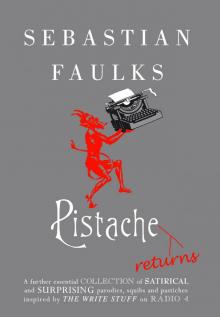 Pistache Returns
Pistache Returns The Girl at the Lion D'Or
The Girl at the Lion D'Or Pistache
Pistache Jeeves and the Wedding Bells
Jeeves and the Wedding Bells A Week in December
A Week in December The Vintage Book of War Stories
The Vintage Book of War Stories Engleby
Engleby Birdsong
Birdsong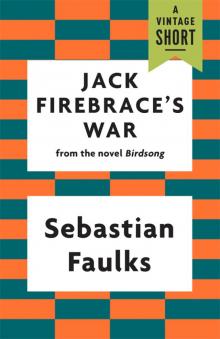 Jack Firebrace's War
Jack Firebrace's War Where My Heart Used to Beat
Where My Heart Used to Beat A Possible Life
A Possible Life The Fatal Englishman: Three Short Lives
The Fatal Englishman: Three Short Lives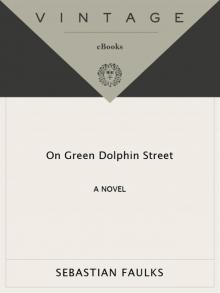 On Green Dolphin Street
On Green Dolphin Street Charlotte Gray
Charlotte Gray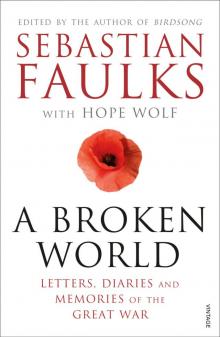 A Broken World: Letters, Diaries and Memories of the Great War
A Broken World: Letters, Diaries and Memories of the Great War Human Traces
Human Traces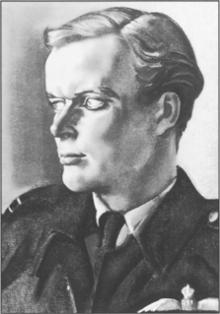 The Fatal Englishman
The Fatal Englishman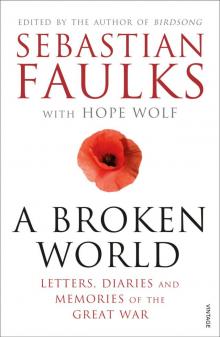 A Broken World
A Broken World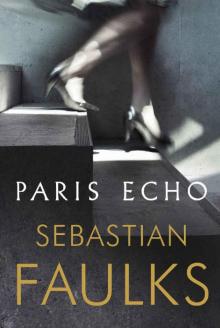 Paris Echo
Paris Echo War Stories
War Stories Girl At the Lion d'Or
Girl At the Lion d'Or